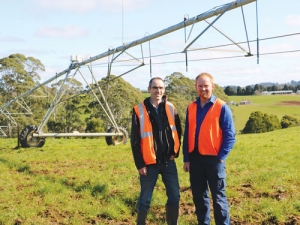Australian teams to help repair North Canterbury irrigators after storm
Moves are afoot to get a team of Australians over here to help repair North Canterbury's irrigation machinery, ravaged by the big windstorm of late October.
 Research and development team leader at the TIA Dairy Centre Dr James Hills with project officer David McLaren.
Research and development team leader at the TIA Dairy Centre Dr James Hills with project officer David McLaren.
Researchers at the Tasmanian Institute of Agriculture (TIA) are developing a system that tells you when to irrigate your pasture, then goes ahead and does it for you.
The system automatically irrigates pasture and it will apply varying volumes of water to the same paddock, which could save farmers time, water and money.
The R&D team leader at the TIA Dairy Centre, Dr James Hills, says the aim is an autonomous machine interface that collects information about the pasture, water use, soil and climate then uses crop modelling processes to decide when and where to apply water.
This is all part of a bigger three year project looking at the use of irrigation water in pastures by collecting data on water use, energy use and pasture production from five sites in Tasmania.
The project gets funding from the federal Department of Agriculture and Water Resources as part of its Rural Research and Development for Profit programme, and from Dairy Australia and TIA.
From the data collected at the five sites the team will work with farmers to make changes to improve water use efficiency and will continue monitoring the sites to measure the success of these changes.
Hills says gathering this data is essential to getting the most out of the new irrigation schemes.
"Significant investment in irrigation infrastructure in Tasmania from the federal and state governments provides the opportunity to increase our agricultural productivity, but we need to make sure we are doing it properly and in a way that is going to be sustainable," Hills says.
"To introduce management strategies that increase efficiency we need that baseline data. We need to know the facts and figures for water use to know how to improve on that use."
The five trial sites have been selected to give enough variability across different topography and soils that are likely to be irrigated.
David McLaren, project officer at the TIA Dairy Centre, is on the ground installing the sensors and data logging equipment at the sites and will oversee the data collected in the field.
"A big part of the project will be to visualise that data, so that when it comes to making management decisions we can quickly know what to do through a visual display of data, and not have to interpret numbers," McLaren says.
"The devices on site will have an interface that you can connect to from your smartphone or tablet so you can start to look at real-time values of pressure, temperature and energy without being physically on site, which is a real advantage."
In its third year the project will trial an automation system at one of the sites to see how this type of system could be used to save farmers time and effort.
"We are interested in how far we can go using a system with a machine interface as opposed to a human interface," Hills says.
To do this, the team
has linked with the National Centre for Engineering in Agriculture at the University of Southern Queensland, which has developed a control platform called VARIWise.
The VARIWise system has been developed and tested in cotton, but this is the first time it will be applied to a pasture based system.
Installation of the sensor and logging equipment on the five sites was completed in October.
Last month's Agritechnica event led to a wide group of manufacturers celebrating successes when the 2026 Tractor of the Year Competition winners, selected by a panel of European journalists, were announced in Hanover Germany.
According to the latest Federated Farmers banking survey, farmers are more satisfied with their bank and less under pressure, however, the sector is well short of confidence levels seen last decade.
Farmer confidence has taken a slight dip according to the final Rabobank rural confidence survey for the year.
Former Agriculture Minister and Otaki farmer Nathan Guy has been appointed New Zealand’s Special Agricultural Trade Envoy (SATE).
Alliance Group has commissioned a new heat pump system at its Mataura processing plant in Southland.
Fonterra has slashed another 50c off its milk price forecast as global milk flows shows no sign of easing.
President Donald Trump’s decision to impose tariffs on imports into the US is doing good things for global trade, according…
Seen a giant cheese roll rolling along Southland’s roads?